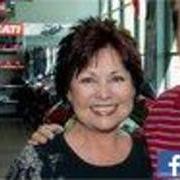Maureen, a young wife and mother, died this week although she didn't have to. You see, she didn't know of her family's history of breast and ovarian cancer until her own late stage diagnosis of ovarian cancer. Her family had not spoken of the disease that had affected several others, so she had no idea that she was carrying a genetic mutation that finally took her life.
Officially named Breast Cancer 2 - Early Onset, the BRCA2 gene is known as a tumor suppressor gene. Normally, it helps prevent cells from growing and dividing too rapidly or uncontrollably. According to the National Cancer Institute, "a defective BRCA2 protein is unable to help repair damaged DNA or fix mutations that occur in other genes. As these defects accumulate, cells grow and divide uncontrollably and form a tumor."
The clues to genetic predisposition are family or personal history of disease. Find out what diseases occurred in your family tree while the information is still available about older generations. Speak openly about the diseases and conditions that might build a genetic profile that could prevent disaster. And if the clues point in that direction, pursue genetic counseling.
Genetic testing for genes associated with disease allows us to improve a person's medical outcome through early intervention and prevention. Genetic evaluation is available for people with a personal or family history of:
•Brain cancer
•Breast cancer
•Colon cancer
•Coronary artery disease
•Endometrial cancer
•Hemochromatosis
•Kidney disease
•Ovarian cancer
•Prostate cancer
With more information about her family history, Maureen could have taken measures to preempt the disease that took her life so aggressively. She would have grown old with her devoted husband, watching their children and grandchildren build a new future. She would have laughed with her friends and played her music and served her community.
She would have . . . if she had only known.






Add a Comment1 Comments
Hello,
Thanks for the interesting blog about how important it is to know your families health history.
I have a friend that’s fighting stage 4 colon cancer so I know what a dreadful disease it is.
I had my first colonoscopy at age 50. A polyp was found and removed. I’m now 58 and I had my second colonoscopy a few weeks ago. Nothing was found this time.
I just want to remind and encourage everyone to get screened for colon cancer. The procedure itself (colonoscopy) is not painful, with the possible exception of the I.V. The preparation the day before is a little inconvenient. Plan to be close to a bathroom.
The ‘official’ guideline is to have a colonoscopy if you are older than 50 and every 10 years thereafter. That is, if you’re at average risk. Check with your physician. Schedule an appointment today!
For more information on colon cancer go to http://www.coloncancerresource.com
June 9, 2009 - 1:49pmThis Comment